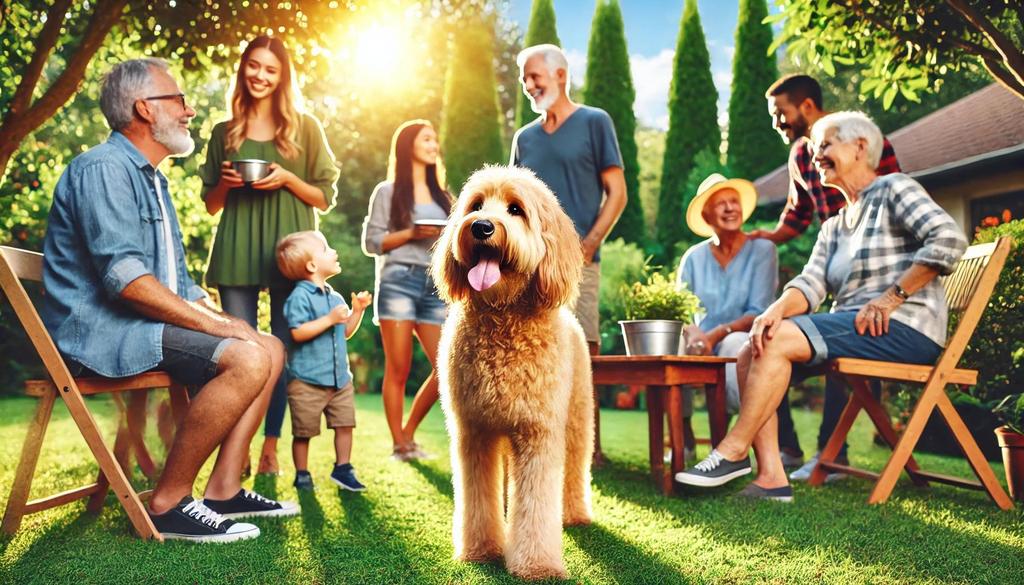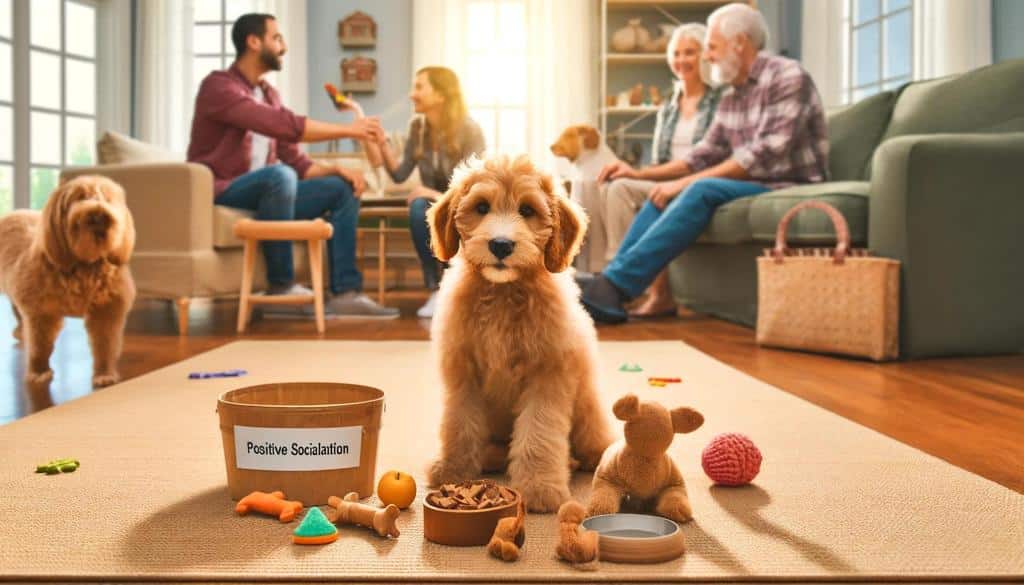Picture this—your Goldendoodle, confident and well-behaved, charming everyone at the dog park. Socializing your Goldendoodle puppy properly from an early age ensures they grow into a happy, well-adjusted adult dog. Goldendoodles, known for their friendly and intelligent nature, thrive when exposed to various social stimuli as puppies. In this guide, we’ll explain the essential steps to socialize your Goldendoodle puppy effectively, starting with the basics and gradually moving to more complex aspects. Let’s embark on this journey to create a joyful and confident companion.
Role of Breeders in Early Socialization (8-12 Weeks)
The foundation for a well-socialized Goldendoodle begins even before you bring your puppy home. Responsible breeders play a crucial role in the early stages of puppy socialization. From as young as three weeks old, breeders should start gently handling the puppies and exposing them to different environments. This early exposure helps shape their behavior and makes a significant difference in their future temperament.
Breeders introduce puppies to various sights, sounds, and smells, which helps them become more adaptable. A good breeder might expose puppies to safe inside and outside environments, car rides, and basic crate training. When puppies are handled and cared for properly during these initial weeks, they develop into friendly and confident dogs.
Creating Positive Early Experiences
Sensory Exposure
As soon as you bring your Goldendoodle puppy home, it’s essential to continue their socialization process. The goal is to expose them to a wide range of new experiences, always in a controlled and positive manner. Think of socialization as introducing your puppy to the world gradually and gently.
Different Sights and Sounds
Puppies need to get used to various sights, sounds, and textures. This includes walking on different types of flooring like carpet, hardwood, and tile. You should also introduce them to diverse people, such as children, elderly individuals, people in wheelchairs, or those using umbrellas. These varied experiences help puppies develop a well-rounded and confident perspective.
Treats and Praise
When introducing something new, make sure it’s a positive experience for your puppy. Use small treats and lots of praise to reinforce good behavior. For instance, if your puppy walks confidently on a new surface, give them a treat and some verbal praise. This positive reinforcement ensures that your puppy associates new experiences with fun and rewards, making them less likely to develop fears or anxiety.
Controlled Environment
Initially, start socializing within your home where your puppy feels safe. Gradually expose them to new environments and experiences at a comfortable pace. Avoid overwhelming situations, like busy streets or large gatherings, until your puppy is more accustomed to smaller, less stressful interactions.

Structured Socialization Activities
Puppy Socialization Classes
Once your puppy has had their vaccinations, enrolling them in a puppy socialization class can be incredibly beneficial. These classes provide a controlled environment where puppies can interact with other dogs and people. They’ll learn basic commands and manners, laying a strong foundation for good behavior. These classes not only help with social interaction but also reinforce positive behavior through structured training.
Playdates and Public Outings
Beyond classes, arrange playdates with other vaccinated puppies to further your Goldendoodle’s socialization. Start with one or two puppies at a time to ensure the interactions are not overwhelming. Gradually increase the number of puppies and the complexity of the environment as your Goldendoodle becomes more comfortable.
Taking trips to pet-friendly stores or parks is another excellent way to expose your puppy to new experiences. Just make sure these outings are safe and controlled. For example, visit during off-peak hours when there are fewer people and animals around.
With consistent, positive socialization, your Goldendoodle will become a confident, well-behaved member of your family. By starting early with the right techniques, you set the stage for a lifetime of happy interactions and experiences.
Positive Reinforcement
Training Techniques
When training your Goldendoodle, it’s important to use positive reinforcement. But what exactly does that mean? Positive reinforcement involves rewarding your puppy for good behavior rather than punishing them for bad behavior. You can use treats, verbal praise, or even their favorite toys as rewards. This technique is effective and humane and helps build a stronger bond between you and your puppy.
For instance, if your Goldendoodle sits on command, give them a small treat and lots of praise. This teaches them that sitting when you say “sit” leads to positive outcomes. Consistency is key, so make sure to reward their good behavior each time they perform it correctly.
Avoid Negative Reinforcement
Negative reinforcement or punishment can often lead to fear and anxiety, which hampers the training process and can strain your relationship with your Goldendoodle. Avoid using physical force or scolding them harshly, as these methods can make your puppy fearful instead of teaching them what you want them to learn. The goal is to have your puppy willingly and happily respond to your commands, not to act out of fear of punishment.
Use positive reinforcement, and be patient and consistent. It may take time, but your puppy will gradually learn the behaviors you want. Always look for opportunities to reward good behavior, making the learning process enjoyable for your Goldendoodle.

Continuous Socialization
Beyond Puppyhood
Socialization shouldn’t stop after your Goldendoodle is no longer a puppy. It’s a continuous process that should extend into their adult life. Regularly introduce your dog to new environments, people, and even other animals. This ongoing exposure helps maintain their social skills and keeps them adaptable to new situations.
For example, if your Goldendoodle only interacts with family members and never meets new people or dogs, they might become overly protective or anxious around strangers. Continuously exposing them to varied experiences prevents this. Take them on different walking routes, visit dog-friendly stores, or invite friends over frequently to keep up their socialization.
Maintaining Positive Experiences
As with early socialization, ensure that new experiences remain positive. Move at your dog’s pace and avoid overwhelming them with too many new stimuli at once. If introducing them to new people, spaces, or dogs, do it gradually and always offer treats and praise. This helps them associate these new experiences with positive feelings.
If your Goldendoodle shows signs of fear or anxiety, like barking excessively or trying to run away, take a step back. Allow them to observe the new situation from a distance where they feel safe and slowly close the gap as they become more comfortable. Patience and positive reinforcement are critical in maintaining their confidence and comfort in different environments.
Path to a Happy and Well-Adjusted Goldendoodle: Time, Patience, and Consistency
Investing time in socializing your Goldendoodle puppy properly will result in a well-adjusted, happy, and friendly dog. The joy of having a Goldendoodle that can interact confidently with people and other animals is immeasurable. Start the socialization process early, use positive reinforcement, and keep up these efforts throughout their life.
By following these guidelines, you’ll be well on your way to raising a Goldendoodle that’s a beloved pet and a well-mannered and confident companion. The journey may be challenging, but the results are well worth the effort. Keep patience and consistency at the forefront, and enjoy the growth and development of your Goldendoodle into a wonderful dog.




